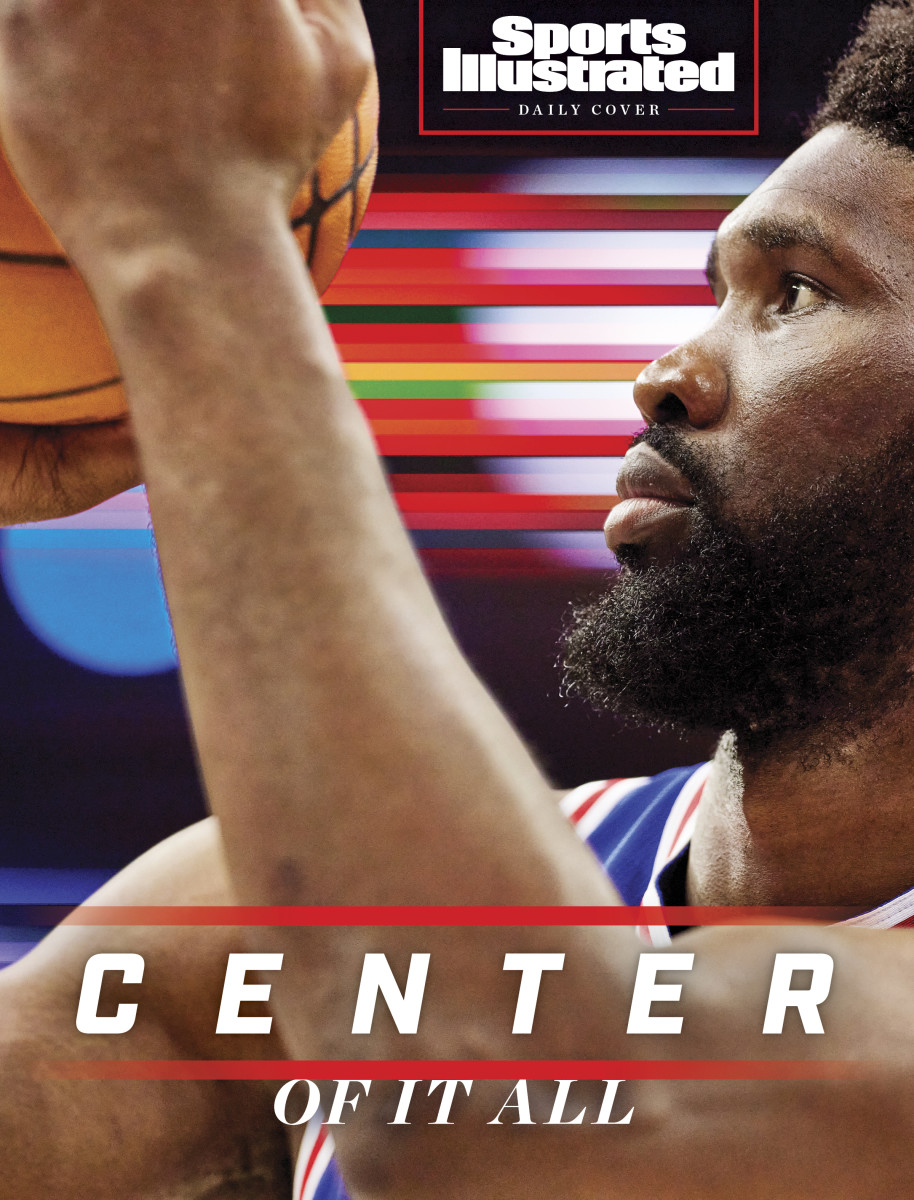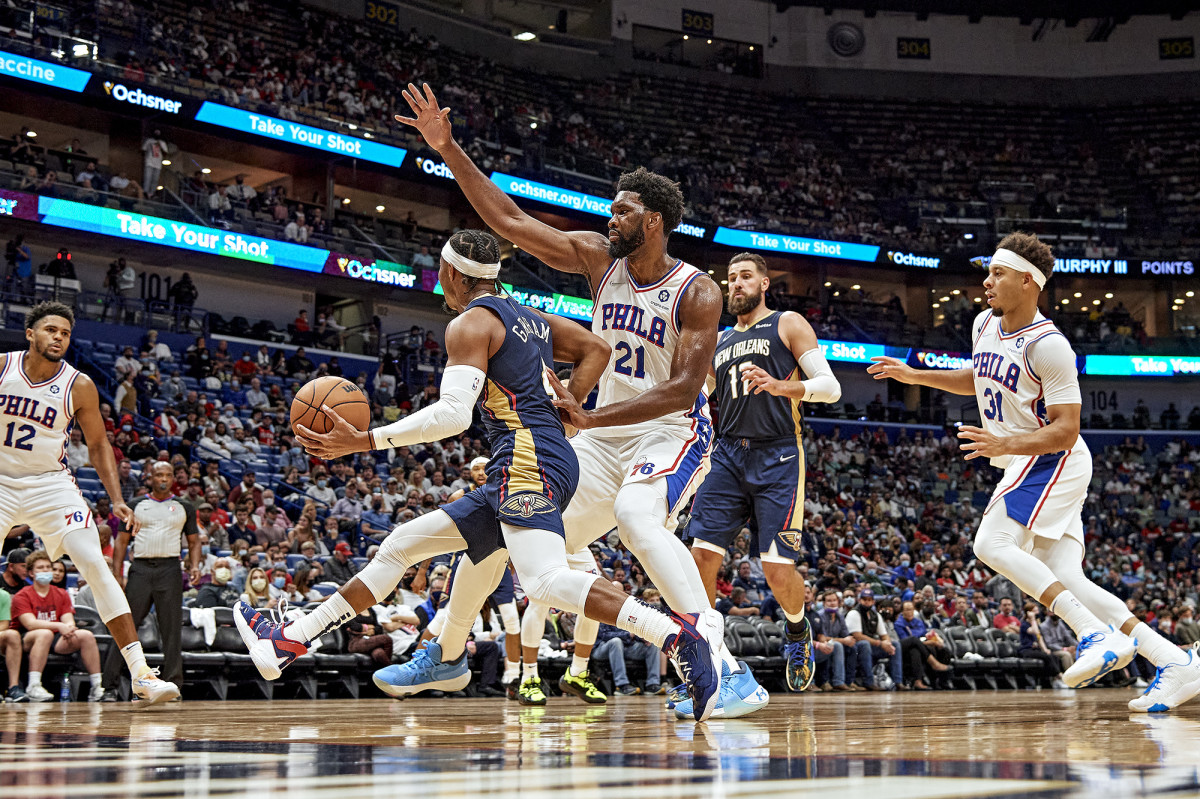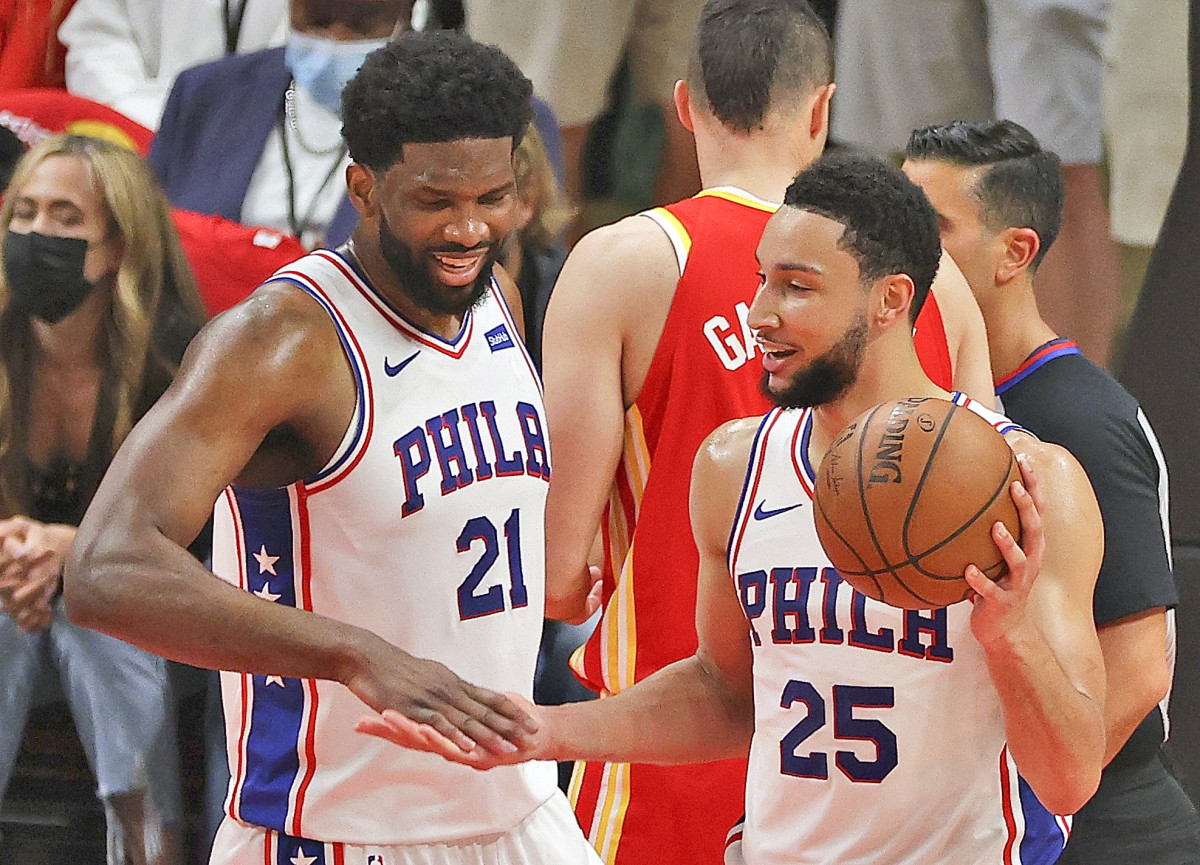Joel Embiid: ‘I Thought I’d Really Lose It’
The black Sprinter van had just made the turn out of the CBS Studios lot when Joel Embiid made an announcement. “I don’t want to be an actor,” the Sixers star says. Last fall, he linked up with WME, the powerful talent agency, in part to figure out what his post-playing career could look like. An hour on the set of The Late, Late Show With James Corden running through a sketch during an off day in Los Angeles isn’t exactly sending Embiid into acting workshops. “I could do it from time to time,” says Embiid. “But every day? Ten hours a day? I don’t have the patience for that. I could be good at it. But I’d rather stay home and sleep.”
It’s also been suggested that Embiid—still just 28—could be an NBA exec. League minutiae has long fascinated Embiid. He’ll regularly buzz Sixers president Daryl Morey to discuss everything from draft evaluations to the salary cap. But full-time? “Nah,” says Embiid. “Too much travel. If I want to travel, I’m doing it outside the U.S.”
It’s late March, and Embiid is stretched out in a front seat by the door of the van, his right leg dangling off a railing. He’s opining about the future, but the sight of Embiid elevating his right foot is enough to give Philly fans flashbacks—Embiid missed his first two seasons after being drafted third in 2014 with a recurring foot injury—but the appendage hasn’t bothered him in years. Everything else? Well . . . Embiid prefers not to discuss injuries, if only to avoid being associated with them again. “I’ve overcome that,” says Embiid. “People used to believe I was never going to play or that I was never going to be good. I don’t want that to creep back in. I’m healthy. I’m fine. I’m good.” His scars, though, tell a story. The one on his left leg, to repair a torn meniscus in his knee, in ’17. On his left hand, the result of surgery to repair a torn ligament in ’20. This season Embiid has regularly sported heavy tape on his right wrist. In a mid-March win over the Lakers, Stanley Johnson, L.A.’s 6' 7", 243-pound forward, wrapped up Embiid on a layup attempt, leaving him to grab at a sore back that plagued him in the final weeks of the season. “The pain he plays through,” says Embiid’s longtime trainer, Drew Hanlen, “it’s f---ing ridiculous.”
Basketball is a subject Embiid is more comfortable with. “I just love to play,” he says, grinning. There’s a purity to Embiid rarely seen in stars of his caliber. He builds relationships with GMs, he says, “because I don’t want to get traded.” After getting a taste of Embiid’s talent in a 31-game stint during the 2016–17 season, his first in the league, Philadelphia offered him a five-year, $146.5 million extension. “I was like, ‘These dumbasses are going to give me $150 million?’ ” says Embiid. “S---, I’ll take it.” Even now, as franchise valuations soar into the billions, he is almost embarrassed by his paycheck. “It’s an insane amount of money,” he says. Reminded that the NBA is a star-driven league, Embiid, who last summer signed a second extension, worth $196 million over four years, shrugs. “Not being from here, not growing up with all this, it’s just kind of wild. I don’t know what to do with it.”

As he speaks, Embiid glances down at his phone, stealing a moment of a Cavaliers-Raptors game. This is the real Embiid. A trip to CBS qualifies as a night out. Recently, he asked a Sixers assistant what he did on road trips. Because I don’t do anything, Embiid deadpanned. He watches video. Lots of video. “He’s a real student of the game,” says Sixers coach Doc Rivers. Embiid perks up when asked about Nikola Jokić, one of his fiercest competitors for MVP this season. “I’m a big fan,” he says. “I’m extremely happy that when you talk about the best players in the league, it’s all bigs that are up there.” In 2020, after getting swept by Boston in the first round, Embiid determined he was too one-dimensional. “I was just a post-up player,” he says. “That made me easier to guard.” Embiid began studying perimeter players. Hanlen says he cut tape of every made field goal by Michael Jordan. Then Kobe Bryant. Then Dirk Nowitzki. Then Kevin Durant. What Hanlen couldn’t find on Synergy or YouTube he got from team archives. “We handpicked pieces of their games that we thought he could emulate,” says Hanlen. They researched Finals MVPs, noting how many attempted at least 20 shots per game during playoff runs. Jordan, Hanlen points out, never attempted fewer than 22. “These guys put their teams on their backs,” says Hanlen.
When a summerlong standoff between Ben Simmons and the Sixers extended into the season, Embiid embraced it as an opportunity. “Drew said to me, ‘Can you carry a team? Can you do what is necessary to make sure your team wins games?’ ” says Embiid. “Obviously, I’m not doing anything alone. But I wanted to see what I could do.”
What he’s done, by any account, has been impressive. Philadelphia, without a three-time All-Star in Simmons for more than half this season, remained among the top contenders in the Eastern Conference. Embiid was a night-in, night-out force and continued to evolve as a deep threat. While L’Affaire Simmons was daily fodder for debate shows, Embiid declined to engage in it, refusing to criticize Simmons while insisting the Sixers, even without their 6' 11" point guard, had enough to win.
“[Embiid] was hell-bent on making sure our guys knew we were going to win this year,” says Rivers. “If Ben wanted to join us, great. If he didn’t, great. We’re winning. I don’t want to hear that we’re not winning.”
The fissure between Simmons and the Sixers is often traced back to last year’s playoffs. In the conference semifinals, Philadelphia was eliminated by Atlanta in seven games. Simmons didn’t make a shot in the fourth quarters of five of them. With the Sixers down two in the final minutes of Game 7, Simmons passed up an open layup on a possession that ended with Matisse Thybulle getting fouled on a more difficult dunk attempt. When asked after the series whether Philadelphia could win with Simmons at point guard, Rivers said, “I don’t know the answer to that right now.” Embiid, when quizzed about the turning point in Game 7, said, “We had an open shot and we made one free throw.”

Embiid hates that quote, along with the suggestion that it somehow fractured his relationship with Simmons. Not because he didn’t say it. But because it’s not all he said. In the same answer he criticized Thybulle, who missed one of his free throws. He blamed himself for committing a turnover in the final minute. He bemoaned the team’s inability to get good offensive possessions down the stretch. “I didn’t call out anybody,” says Embiid. “This is what [the media] does. I listed a bunch of stuff that happened. And that one little piece of it was everywhere. We couldn’t get anything going. It’s unfortunate, but if, as a player, if you want to read into that, I can’t help you.”
Even if he was singling out Simmons, so what? “I’m always going to challenge my teammates,” Embiid says. He believed he had supported Simmons. For years Embiid worked more on his perimeter game—a Simmons weakness—largely to space the floor and open up driving lanes. Besides: Embiid knew criticism. He was hit with waves of it during his first two seasons. For his attitude. For his work ethic. For his diet. The perception of Embiid’s rehab was that it was spent eating cheesesteaks and mainlining Shirley Temples. All this while dealing with personal tragedy. In 2014, when Embiid was rehabbing with the Sixers, his 13-year old brother, Arthur, died after a runaway truck careened into a Cameroonian schoolyard. In the months that followed, Embiid considered moving back to Africa. Perhaps he’d play volleyball, a sport he excelled at as a teenager. Maybe handball, his father’s game. “I was in a bad place,” says Embiid. “And that’s when all the stories were coming out every single day. ‘Oh, Joel, he doesn’t want to work. He’s a bust. He’s never going to play.’ There was all this bad stuff. And then you add my loss.” Embiid’s voice trails off. “People don’t understand the human side of all of it,” he says. “But I never complain about it. We make a lot of money. [Criticism] comes with it.”
In the weeks that followed the Sixers’ playoff exit, Embiid figured temperatures would cool. Only they didn’t. Reports trickled out about Simmons’s unhappiness in Philadelphia. About how he wanted a fresh start. About how, according to The Athletic, Simmons believed his partnership with Embiid had “run its course.” Embiid saw all of it. “I read everything,” he says. He believed most of it. “I was pissed off. There were so many times that I thought I’d really lose it.”
The Sixers did, too. “Joel will say what he thinks sometimes,” says Rivers. But he didn’t. As much as he likes being in the loop, he never pressured Philadelphia’s front office because, says Embiid, “I don’t want to be responsible for any decisions that were made.” At the Sixers’ home opener, Embiid addressed the crowd before the game and encouraged fans to support Simmons. When asked during the season whether there was any urgency to get something for Simmons, Embiid reiterated repeatedly that he believed in the current roster—and that if Simmons wanted to join it, he would be welcomed back. “I can’t imagine the pressure he had individually because he was linked to it the most,” says Rivers. “He handled it like an absolute pro.”
Embiid’s motivations were simple. Lashing out at Simmons had no value. “He’s no dummy,” says Sixers swingman Danny Green, who has been a part of three championship teams during his 13-year career. “He knows he needs people.” For months, Embiid believed Simmons would return. “He was losing a lot of money,” says Embiid. “At some point I started to feel bad for him.” Moreover, Embiid—who not only lived through The Process, but also took it as his nickname—has zero interest in amassing more draft capital or winning a title a few years down the road. “I’m trying to win a championship,” he says. “Whatever gets me the best chance to win a championship, that’s what I’m going to do. We needed to help him as much as possible. If he comes back, we got to take him back and try to go win a championship. If he still wants to get traded, we got to do whatever is necessary to make sure that we don’t go and trade for, I don’t know, a first-round pick, or a second-round pick, or whatever, because what does that do for me? I’m not going to be able to work with a bunch of first-round picks or second-round picks. So, to me, I always looked at the bigger picture.”

Months passed. Simmons showed no interest in returning. Morey, with Embiid’s support, steadfastly refused to trade him for anything less than a superstar in return. In the locker room, though, morale was plummeting. Rivers says things were hard. “The guys were just over it,” he says. “We were winning games, and, every town we went to, we were talking about Ben. I don’t know if we could have gotten through the second half of the season with that hanging over our heads. I was praying something happened.” In February, hours before the trade deadline, it did. Philadelphia flipped Simmons to Brooklyn in a package for All-Star guard James Harden.
Embiid has not spoken to Simmons. Not since the trade. Not substantially in the months before, either. Simmons was around the team facility but, says Embiid, “We never saw him.” Embiid says he still doesn’t know what drove Simmons away. Someday, he hopes to. “I don’t have any hard feelings,” he says. “I don’t have any hate toward him. I wouldn’t mind being friends. That’s just me. I don’t care. Honestly. I respect the decision he made. I think it’s unfortunate what happened, but to me it’s whatever.”
It seemed like a softball: Is this your best chance to win a championship? Why wouldn’t it be? On paper, the Sixers are loaded. Harden, the former MVP, is an elite scorer, who, with Embiid, creates the NBA’s most dynamic pick-and-roll combination. After years of shuffling through All-Star teammates, Harden has described the fit next to Embiid as “perfect.” Tyrese Maxey, who slid into Simmons’s starting spot, had a breakout sophomore season as a sweet-shooting point guard. Tobias Harris, perhaps miscast as a No. 2 scoring option last season, is now overqualified as a fourth. Thybulle ranks among the NBA’s best perimeter defenders. Yet when posed the question, Embiid demurs. “I can’t really answer that,” he says. “Because I felt the same way with the previous teams that we had because I believe in myself and the team so much. And even looking back, I still believe that if everybody would’ve played at their potential last year, we could have made at least the conference finals.”
A title matters to Embiid. “I won’t stop until I win one for this city,” he says. Winning MVP, though, matters too. “I never thought I’d be at this level,” he says. Last summer a clip circulated of a teenage Embiid, still in high school, catching an outlet pass, taking one dribble, elevating . . . and finding himself behind the backboard. At Kansas, he asked to be redshirted before what turned out to be his only season. When pro scouts projected him as the top pick, he told them he wasn’t ready. When he got to the NBA the only award he was interested in was Defensive Player of the Year.

Now Embiid sees MVP and the Sixers’ success as being linked. “Let’s say I average 35 points on a bad team,” he says. “I can’t be the MVP of the league, because I’m not winning.” Legacy matters to Embiid even more since he became a father. His son, Arthur, was born in 2020. Occasionally, he sees traits of his brother in his toddler. “The energy, how he’s always smiling, joyful, the attitude,” says Embiid. “And he likes to be bossy.” He doesn’t want Arthur to play basketball. “Soccer,” Embiid says. But he wants Arthur to look up to his father, like Embiid looked up to his. “My dad was really good at handball,” he says. “And I used to be like, ‘Wow, I want to be that good. I want to be better than him.’ That’s how I want my son to think about it.
“I want him to see his dad play at the highest level.”
As the van pulls up to Embiid’s Beverly Hills hotel, the topic again turns to his future. “I still don’t have something that I’m really passionate about,” he says. “At this point of my life, I wouldn’t do anything just to do it. I would do it if I love it. I’m blessed enough and I’m lucky that I’ve made enough. So to me it’s all about the joy, and if I don’t like it, then there’s no point in doing it.”
Fortunately, there is plenty of time to figure it out. Besides, he’s got more pressing things on his mind.
More SI Daily Covers:
• The Inevitability of Cade Cunningham
• Nikola Jokic Gets Lost Among the Stars. And He’s O.K. With That.
• Behind Ja Morant’s Sudden Ascent to NBA Superstardom
